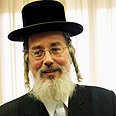
Israel Eichler
צילום: אלכס קולומויסקי
Who will judge the judge?
What is the better option? Torch of democracy, human rights for women and minorities – or a single ruler who overrules the elected Knesset, annuls laws and roots-out anything reminiscent of Jewish tradition?










